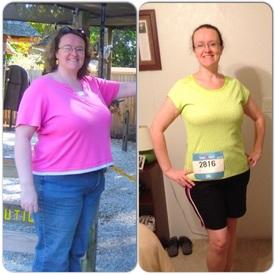Why Eating Exercise Calories is so important.
Replies
-
This week I decided to test this theory and ate back all my exercise calories and did not lose a pound, not even a tenth of a pound. So I'm going back to what worked for me before - setting my net calories at slightly higher than what MFP recommends and only eating back SOME of my exercise calories if I'm still hungry. So I guess you could argue that just by setting my net calories higher than what MFP recommends, that I am, in fact, eating back exercise calories - but that's my net regardless of whether or not I exercise, and I only increase them by 100 higher than what MFP recommends. And I also agree with the fact that if you exercise a lot or burn a lot of calories, you definitely should not attempt to eat them all back. Let's be real, we're not olympic athletes, so we don't need to eat loads of calories to fuel our bodies when we exercise. And by exercise, I mean going to a gym or setting aside time to do an actual workout. I don't think anyone should be counting "cooking" or "doing housework" as exercise if you're planning to eat your exercise calories back.
I also want to point out, as I did in my earlier post to the OP, that the calories burned on both the cardio equipment and especially here on MFP are GROSSLY overstated. Best thing we can do is invest in a good HR monitor (I recommend the Polar FT7) and even then I don't assume that I burned as much as what my HRM shows, and that number is significantly lower than what the cardio equipment or MFP says I burned. So if you eat back all of what MFP or the cardio equipment says you burned, you're more than likely eating a surplus and your net is no longer a deficit. So just be conservative if you're choosing to eat back your exercise calories. Better to error on the side of caution - in my opinion.
But I guess at the end of the day, we all have to do what works best for us, and unfortunately it takes some trial and error to find the "sweet spot" for our bodies to lose weight.
To have to give any change more than a week to decide whether it is working or not - it can take a few weeks foryour body adjust. Coming to a conclusion as to whether it works of not after a week is way too early.
That being said, I do agree that equipment and MFP can grossly overestimate the calories burned which is why a buffer should be built in to how many exercise calories. I also agree that doing regular housework etc should not be counted as it should already be counted in the base calories (activity level).
True...but I do intense exercise (bootcamp and Insanity DVDs) most days of the week and when I ate all my exercise calories back, I felt bloated. So I personally don't think it's a good idea to eat them all back. I eat about half of them back when I do an intense workout and when I do a lighter workout I eat about a quarter of them back, and by doing that, I have consistently lost between 1-2 pounds each week - so I wouldn't want to lose more than that each week anyways. I should also point out that I have about 80 pounds to lose, so maybe eating back exercise calories is more effective for those who only have a little bit left to lose.0 -
This week I decided to test this theory and ate back all my exercise calories and did not lose a pound, not even a tenth of a pound. So I'm going back to what worked for me before - setting my net calories at slightly higher than what MFP recommends and only eating back SOME of my exercise calories if I'm still hungry. So I guess you could argue that just by setting my net calories higher than what MFP recommends, that I am, in fact, eating back exercise calories - but that's my net regardless of whether or not I exercise, and I only increase them by 100 higher than what MFP recommends. And I also agree with the fact that if you exercise a lot or burn a lot of calories, you definitely should not attempt to eat them all back. Let's be real, we're not olympic athletes, so we don't need to eat loads of calories to fuel our bodies when we exercise. And by exercise, I mean going to a gym or setting aside time to do an actual workout. I don't think anyone should be counting "cooking" or "doing housework" as exercise if you're planning to eat your exercise calories back.
I also want to point out, as I did in my earlier post to the OP, that the calories burned on both the cardio equipment and especially here on MFP are GROSSLY overstated. Best thing we can do is invest in a good HR monitor (I recommend the Polar FT7) and even then I don't assume that I burned as much as what my HRM shows, and that number is significantly lower than what the cardio equipment or MFP says I burned. So if you eat back all of what MFP or the cardio equipment says you burned, you're more than likely eating a surplus and your net is no longer a deficit. So just be conservative if you're choosing to eat back your exercise calories. Better to error on the side of caution - in my opinion.
But I guess at the end of the day, we all have to do what works best for us, and unfortunately it takes some trial and error to find the "sweet spot" for our bodies to lose weight.
To have to give any change more than a week to decide whether it is working or not - it can take a few weeks foryour body adjust. Coming to a conclusion as to whether it works of not after a week is way too early.
That being said, I do agree that equipment and MFP can grossly overestimate the calories burned which is why a buffer should be built in to how many exercise calories. I also agree that doing regular housework etc should not be counted as it should already be counted in the base calories (activity level).
True...but I do intense exercise (bootcamp and Insanity DVDs) most days of the week and when I ate all my exercise calories back, I felt bloated. So I personally don't think it's a good idea to eat them all back. I eat about half of them back when I do an intense workout and when I do a lighter workout I eat about a quarter of them back, and by doing that, I have consistently lost between 1-2 pounds each week - so I wouldn't want to lose more than that each week anyways. I should also point out that I have about 80 pounds to lose, so maybe eating back exercise calories is more effective for those who only have a little bit left to lose.
You are correct - you can be at more of a deficit the more weight you have to lose without messing with your metabolism and/or fat v muscle loss ratio. Also, there is less need to eat your calories back if you work-outs are low intensity.0 -
This is a great thread and very well explained.
I know from my personal experience the weeks I eat most, if not all my exercise calories back I lose more weight.0 -
bump0
-
That is awesome advice. I have been looking everywhere trying to find out why people eat back there exercise calories and now it finally makes since. Thanks everyone! I'm going to try this cause I have been the same weight for 3 weeks now.0
-
Thanks...was a little confused about this...0
-
I don't have time to read this atm, but I'm commenting so I can find it in my posts later...I've often wanted to know as well! (need to be doing hw right now though) So i'll read later

thanks for putting it on here!0 -
Very well explained. Thank you OP.0
-
Appreciate the explanation....time to make some adjustments!0
-
Thank you for taking the time to explain this in an understandable way! !
:flowerforyou:0 -
Somebody quote a legitimate nutritionist, preferably PhD that isn't a hot over-marketed model, that supports this and HRM's that indicates eating exercise calories is so important.0
-
Somebody quote a legitimate nutritionist, preferably PhD that isn't a hot over-marketed model, that supports this and HRM's that indicates eating exercise calories is so important.
Nah. You just go ahead believing what you believe, the rest of us will believe what we believe and everyone will be happy. Savvy?0 -
Bump0
-
Fantastic explanation.0
-
Somebody quote a legitimate nutritionist, preferably PhD that isn't a hot over-marketed model, that supports this and HRM's that indicates eating exercise calories is so important.
It's basically math - if you do not eat your calories back (and assuming that you have a deficit already baked into your base) then not eating your exercise calories back, increases you deficit. Not sure why you need a PhD for that. Where the nutritional infomation comes in is what the impact is from a 2000 calorie deficit v a 500 calorie deficit -the difference being created by exercise (and yes I know 1,500 is on the high side for exercise - its just an example)..0 -
me too!! ThanksThanks Op I needed this!!! 0
0 -
I call BS! I want my body to burn muscle rather than fat, thank YOU very much!
Hahaha, then you'll be all wimpy and have to change your name to hitchhiker 0
0 -
Wow - thanks, seemed conter-productive to me to eat what I lost (a lot like eating from the toilet
 but now I understand better how it works. Really appreciate the explanation. Big leap of faith, but digesting (no pun intended) the info I think I can see the reasoning.
but now I understand better how it works. Really appreciate the explanation. Big leap of faith, but digesting (no pun intended) the info I think I can see the reasoning.
Thanks again!0 -
Somebody quote a legitimate nutritionist, preferably PhD that isn't a hot over-marketed model, that supports this and HRM's that indicates eating exercise calories is so important.
It's basically math - if you do not eat your calories back (and assuming that you have a deficit already baked into your base) then not eating your exercise calories back, increases you deficit. Not sure why you need a PhD for that. Where the nutritional infomation comes in is what the impact is from a 2000 calorie deficit v a 500 calorie deficit -the difference being created by exercise (and yes I know 1,500 is on the high side for exercise - its just an example)..
How do you know what you burn? HRM's only show the initial burn, if it's even accurate, but they don't account for the increased calorie burn that extends for hours after your exercise. If it's SO important don't you need to account for that somehow?0 -
bump. very good information, will reference it again when I forget about it. Thanks0
-
Somebody quote a legitimate nutritionist, preferably PhD that isn't a hot over-marketed model, that supports this and HRM's that indicates eating exercise calories is so important.
It's basically math - if you do not eat your calories back (and assuming that you have a deficit already baked into your base) then not eating your exercise calories back, increases you deficit. Not sure why you need a PhD for that. Where the nutritional infomation comes in is what the impact is from a 2000 calorie deficit v a 500 calorie deficit -the difference being created by exercise (and yes I know 1,500 is on the high side for exercise - its just an example)..
How do you know what you burn? HRM's only show the initial burn, if it's even accurate, but they don't account for the increased calorie burn that extends for hours after your exercise. If it's SO important don't you need to account for that somehow?
That does not negate the comment. I agree knowing how much to eat is problematic - and so, as I stated in my previous points, you should be conservative in how much you eat back.0 -
I never eat back my exercise calories... and I think my ticker speaks for itself. I'm just sayin....0
-
Bump
Great thread. Great explanation.0 -
I never eat back my exercise calories... and I think my ticker speaks for itself. I'm just sayin....
People are not saying that you won't lose weight (well most are not) - tickers do not show how much body fat v lean muscle mass you lose and it does not indicate how much you would have lost if you had eaten them back.....just sayin.....
EDIT: sorry - forgot to add: well done on your weight loss0 -
why should my body start burning muscle when I still have 40% fat? it buffles me. since i have just joined, i will try not to consume my exercise calories and see how it goes!
Your brain is smart and knows your muscles are much more nutritious to feed your body with than fat, so that's why they say muscle starts to go. Just like a pregnant woman who doesnt eat so well... The baby will get first dibs and takes what it needs and the moms body gets whats left. The body doesn't know we want to look hott in a bikini, it just is trying to survive bottom line and when it feels threatened it does what it has to do 0
0 -
This is the first time I read a clear explanation of why I should eat back my calorie burns never made sense before does now, THANKS!!0
-
The best explanation I've heard yet...Thanks

I totally agree....this confuses alot of people on MFP, your explanation makes perfect sense. Thanks!0 -
Bumping for later. Thanks0
-
LOVE IT!0
-
My personal experience and opinion is everybody is individual. I do not believe all fiqures and techniques suit all persons, way too many variables. Previously I lost 110kg in 16 months and kept it off for 9 yrs. Yes , I'm back, poor choices and career is the reason. When I lost my weight I only had 1 figure to work with, my fat burning zone heart rate. I can remember I ate very little and walked between 6km, and 12 km a day on treadmill hitting my target heart rate. Metabloic rates sourced from online calculators and programs can be highly misleading and as that is 1 of the main figures we base programs on, it can cause even more confusion.I also see huge discrepancies with calories burnt, this also effects the final outcome. I embrace all information and opinions I get from MFP, even when it,s provided as a "fact". I understand "eating exercise calories" and it may work for a large percentage, It may not work for all due to varying metabolic rates. I do not encourage anybody to do as I have In the past and even I am trying a varied approach this time around thanks in general to the information and opinions I have found on MFP.0
This discussion has been closed.
Categories
- All Categories
- 1.4M Health, Wellness and Goals
- 398.2K Introduce Yourself
- 44.7K Getting Started
- 261K Health and Weight Loss
- 176.4K Food and Nutrition
- 47.7K Recipes
- 233K Fitness and Exercise
- 462 Sleep, Mindfulness and Overall Wellness
- 6.5K Goal: Maintaining Weight
- 8.7K Goal: Gaining Weight and Body Building
- 153.5K Motivation and Support
- 8.4K Challenges
- 1.4K Debate Club
- 96.5K Chit-Chat
- 2.6K Fun and Games
- 4.8K MyFitnessPal Information
- 12 News and Announcements
- 21 MyFitnessPal Academy
- 1.6K Feature Suggestions and Ideas
- 3.2K MyFitnessPal Tech Support Questions























